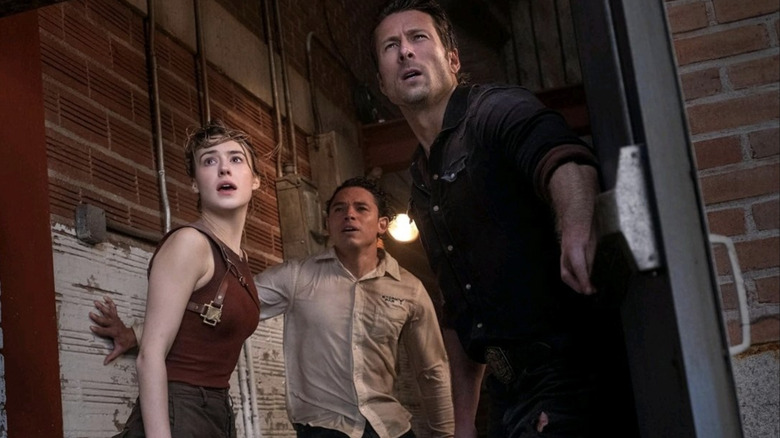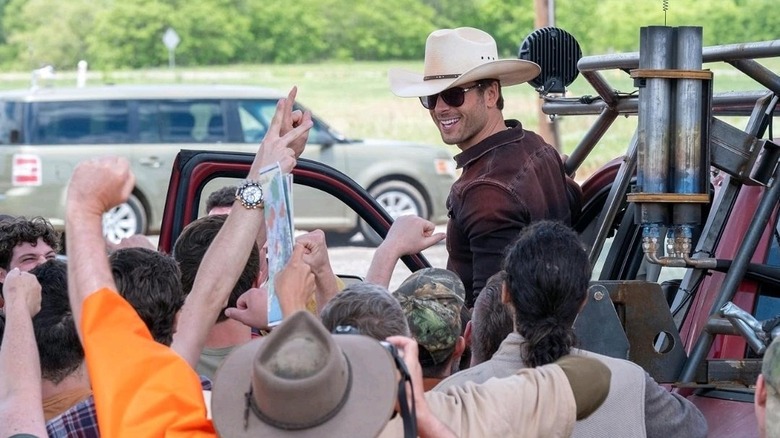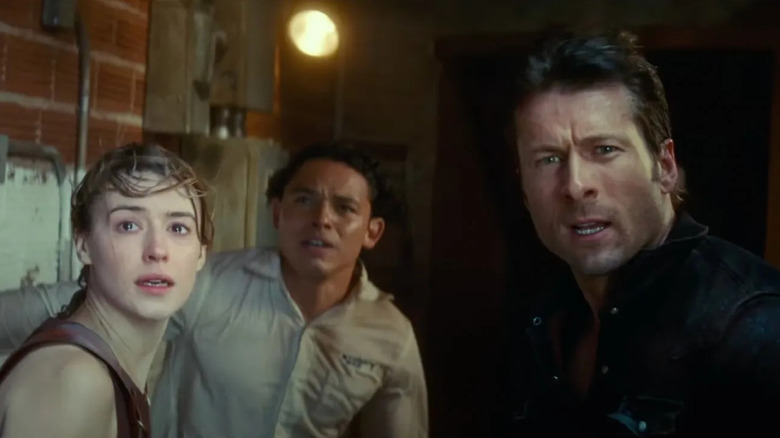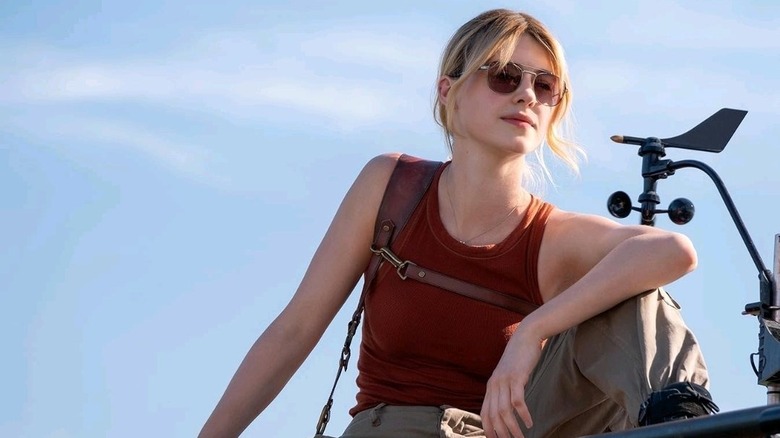Twisters Director Took His Cues From Several Golden Age Filmmakers [Exclusive]
This article contains spoilers for "Twisters."
As the title suggests, the main attraction in "Twisters" are the multiple tornadoes, forces of nature that range from EF1s to terrifyingly disastrous EF5s. Given that the film's story involves several groups of storm chasers tooling around Oklahoma, attempting to devise a way of mitigating (or, hopefully, completely dissipating) a tornado once it's formed, it would seem likely that director Lee Isaac Chung's biggest influences on the film would include other natural disaster movies, adventure films, and so on.
Yet, just like the original "Twister," "Twisters" has more going on beneath the surface. Just as storm chasers Kate (Daisy Edgar-Jones), Tyler (Glen Powell), and Javi (Anthony Ramos) are struggling with various ethical issues surrounding the study of tornadoes and how to best help with the after effects of their arrival, they're also caught in a love triangle, with Kate fielding longtime colleague and friend Javi's affections while she fights her own attraction to Tyler, who seems initially like a fame-hungry blowhard, but has a surprising depth she can't deny.
My apologies to the freaks out there (and I'm one of you!), but this is not "Challengers" redux; Chung and his cast let the tornadoes handle all the sucking and blowing. The love triangle in "Twisters" is presented in classic Hollywood romance fashion all the way, and it's that much more charming for it. As it turns out, this traditional rom-com approach was entirely intentional on Chung's part, as he was primarily influenced by some of classic Hollywood's premier screwball comedy filmmakers.
How Hawks and Capra found their way into Twisters
I was lucky enough to speak to Chung on the eve of the release of "Twisters," a conversation that you can either read here or listen to on today's episode of the /Film Daily podcast (find it below, or on whatever podcast platform you prefer). During our discussion, Chung revealed the classic directors whose work primarily influenced his approach to the love triangle in "Twisters":
"You mentioned the 1930s films, and that's something that I was definitely watching a lot. I was looking at a lot of screwball stuff like Howard Hawks and seeing the way — [Frank] Capra as well — looking at the way they would tell their stories of various characters and their relationships changing, ultimately to come to the ending that happens in this movie."
Although romance and comedy have gone hand-in-hand since at least the time of William Shakespeare, the screwball comedies of the '30s and '40s are some of the finest rom-coms ever made, thanks in large part to their emphasis on theatricality, dialogue, and farce. The films of Howard Hawks and Frank Capra are some of the best examples of the subgenre, especially Capra's "It Happened One Night" from 1934 and Hawks' "His Girl Friday" from 1940. In those films, as in "Twisters," the relationship dynamics are enacted primarily through bantering, functioning almost as a sort of lighthearted version of the "enemies to lovers" trope.
One filmmaker Chung didn't specifically mention is George Cukor, but I'm certain that Cukor's 1941 classic "The Philadelphia Story" had an impact on the central triangle of "Twisters," where the female lead is pursued by two very different yet equally viable men on the same level of intelligence, strength, and wit as her.
Love, Actually is all around Twisters
At the close of "Twisters," Kate is being dropped off at the airport to go back to New York City in order to get funding for the tornado dissipation system that she, Javi, and Tyler just helped field test. While Javi has accepted that Tyler has won Kate's heart, Tyler isn't sure whether to pursue her or accept her leaving, until finally he chases her into the airport where he makes his feelings known. The "chase your romantic interest into the airport" trope has been a staple of the rom-com for quite a while now, popularized most by 2003's "Love, Actually" and several episodes of the sitcom "Friends."
As with the screwball comedy influences, this classic rom-com finale was also wholly intentional on Chung's part, as he confirmed to me:
"I kind of give a nod to the rom-com with the airport, and that's all intentional, just to let the ending have a cheeky sort of nod to that genre."
Of course, the romance elements of "Twisters" isn't restricted to just screwball movies and "Love, Actually." Most surprisingly, there's not a big kissing scene between any of the characters, either in the body of the movie or during that airport climax. This decision feels like a nod to the works of Jane Austen as well as the films adapted from her novels, which tend to put less emphasis on physical consummation between lovers and more of a focus on the yearning they feel. In other words, the romances in Austen, as in "Twisters," are far more chaste.
The romantic legacy of Twisters
For those who may feel that a movie about tornadoes running rampant across Oklahoma is no place for a love triangle subplot, may I remind them that the original "Twister" from 1996 was very much a "rekindled love" story between storm chasers Jo (Helen Hunt) and Bill (Bill Paxton). Dare I say it's even Shakespeare-esque, with Jo and Bill being akin to Beatrice and Benedict from the Bard's "Much Ado About Nothing" (a dynamic Glen Powell is intimately familiar with). It's also literally Hawks-esque: The screenwriters of "Twister," married couple Michael Crichton and Anne Marie-Martin, deliberately patterned their film's love triangle on "His Girl Friday," meaning that screwball comedy is part of the "Twister" DNA.
In that way and in others, "Twisters" feels like a genuine throwback movie; not one that's bogged down with winking, meta references to cinema's past, but one that embraces the way old Hollywood crowd pleasers (including ones from the 1990s, like "Twister" itself) loved to include a charming romance in the mix for good measure.
"Twisters" is in theaters now, and my interview with Chung can be heard on today's episode of the /Film Daily podcast, along with a chat with /Film editors Ben Pearson and Brad Oman (aka Ethan Anderton) featuring our thoughts on the movie:
You can subscribe to /Film Daily on Apple Podcasts, Overcast, Spotify, or wherever you get your podcasts. Please send your feedback, questions, comments, concerns, and mailbox topics to us at bpearson@slashfilm.com. Be sure to leave your name and general geographic location in case we mention your e-mail on the air!



